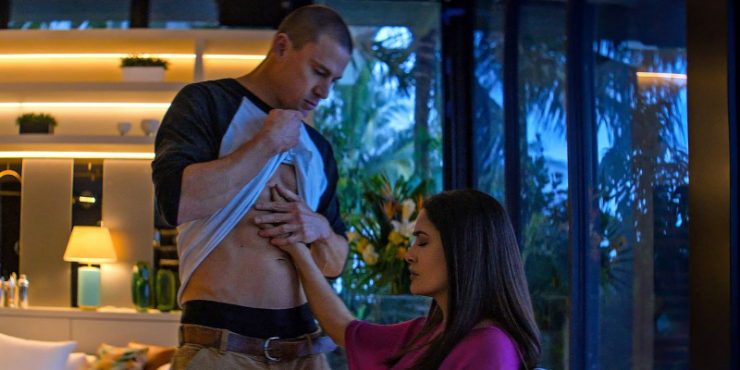It’s indicative of Steven Soderbergh that each film in the Magic Mike franchise distinguishes itself against the one that came before it. Soderbergh has done this before, with Ocean’s Eleven and its two subsequent sequels. Despite his best efforts, the Ocean films became a practice in diminishing returns. With Magic Mike, the arc is not as simple. The original 2010 film was a comedy-drama with a mumblecore aesthetic that purposely worked against the promiscuity of the subject matter. 2015’s Magic Mike XXL got rid of Matthew McConaughey and the narrative baggage his character held, and opened Mike’s story into a guys-being-dudes road trip movie that works both as a titillating exhibition of beefcake and an earnest pursuit of female pleasure. Magic Mike’s Last Dance, almost too self-consciously aware of XXL‘s exuberant playfulness, becomes once again something totally new: a transcontinental love story.
One of the charms of the first two Magic Mike movies is how perfunctory the romances were – the relationships are treated with the kind of transient casualness that seemed realistic for a guy like Mike (played always with the magnetic charisma of Channing Tatum). That Last Dance dares to wrangle Mike into submission is a narrative risk, one that screenwriter Reid Carolin (author of all three scripts) dives into without much consideration for what’s come before. The move – along with the movie’s London setting – sets Last Dance apart from the previous two films. Away from the Florida sleaze of the first Magic Mike and the platinum luxury of XXL (which, it should be noted, is officially directed by Gregory Jacobs, Soderbergh’s main assistant director), Last Dance feels sentimental, a shade short of melancholy but reflective. Perhaps it makes sense as the ending of a trilogy, even if it doesn’t always makes sense as the ending of this trilogy.
One thing Last Dance does keep is Tatum, whose Mike Lane has gone from a King of Tampa to a furniture store owner to a Miami bartender. His business collapsed with the pandemic, which forces him back into the gig economy he’s been trying to escape since the first film. When he bartends at a charity event, he’s invited inside the home of the hostess, Maxandra “Max” Mendoza (a wonderful Salma Hayek), a wealthy woman working diligently on divorcing her unfaithful (and even wealthier) husband. Max has heard of the restorative powers of Mike’s talents, and offers him six thousand dollars for a single dance. What follows is a masterpiece of immersive dry humping all over the various surfaces of her living room. When it’s all said and done, she makes Mike an offer: follow her to London for a job and an additional $60 thousand.
The job ends up being director of a long-standing play in a theater Max has wrangled away from her estranged husband. The play, “Isabella Ascendant”, is a Chekhov-esque period melodrama about a woman torn between two men. Max is tired of the play’s stuffy, misogynist bent, and hires Mike to reboot the show as a male stripping exhibition. With her resources, Max calls upon the best male dancers across Europe, and brings them to London to be coached by Mike. Motivated by her hatred of her husband and propelled by her chronically impulsive nature, Max brings Mike everything he needs, including room and board in her lush home. Also there is her moody, precocious daughter, Zadie (Jamelia George), and a quippy butler named Victor (Ayub Khan Din). Carolin’s script stacks the tropes, but Soderbergh is clever enough to present them in a palatable fashion, even if it’s not always justified.
As the story proceeds, and Max’s husband Roger (Alan Cox) makes moves to shut down her re-imagining of “Isabella Ascendent”, Last Dance becomes more Max’s story than Mike’s. Her battles with her husband and her own inner struggle with both her commitment to Zadie and her mixed emotional feelings for Mike, make her the more compelling figure between the two of them. The decision allows the movie to lean into Hayek’s incredible performance. Her Max is a legitimate co-lead character, and Hayek’s performance of her – hilarious and unpredictable, a live-wire interpretation of impatient new money – is radiant, the film’s greatest asset. Where the first two Magic Mike films treated the love interests (Cody Horn and Amber Heard, respectively) as cursory screenwriting stand-ins, Last Dance gives us legitimate romance. A tension is created, as the romance steals away from what you expect to see in a Magic Mike movie – lightweight sexual abandon – but gives us something rich in its place.
Since ending the shortest retirement in Hollywood history (which may have been even shorter if the rumor of him ghost-directing XXL are true), Soderbergh has become an even more idiosyncratic filmmaker than he was before. His last eight films have all had active antipathy for the cosmetic gloss of contemporary movies, preferring to shoot his movies on high-tech cell phones and caring little for visual alacrity (I’ll never forget how he seemed to go out of his way to reflect set lights off of Meryl Streep’s glasses in Let Them All Talk). Narrative rhythms take a back seat to eccentric side roads (a five-second “intermission” card plays inexplicably during Last Dance‘s triumphant finale). It’s almost as if movies are just a vessel to allow him to play with new, lo-fi camera techniques that less-acclaimed filmmakers could never attempt (the fish-eye lenses of No Sudden Move). Like the rest of these movies, Last Dance has a low ceiling, with no aims toward artistic virtuosity, but it left me sated. And its romantic leads have great chemistry, which is a bar many contemporary Hollywood films fail to hurdle.
Directed by Steven Soderbergh










